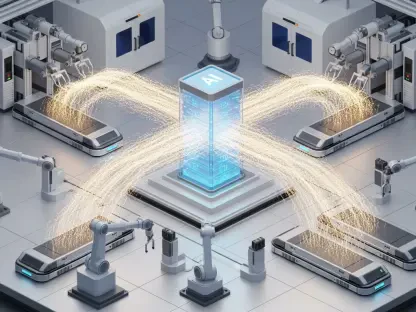The manufacturing and packaging industries are undergoing a significant transformation driven by advanced technologies such as Artificial Intelligence (AI), the Internet of Things (IoT), and automation. These innovations, collectively referred to as AIoT, are not only reshaping industry practices but also driving future growth. By enhancing operational efficiency, safety, and productivity, AIoT provides manufacturers with smarter systems that can adapt to real-time changes, predict issues before they occur, and optimize processes immediately. Predictive maintenance, leveraging AI to foresee equipment breakdowns with an accuracy rate exceeding 99%, emerges as a noteworthy innovation. This capability cuts costs substantially and boosts uptime, proving invaluable for the continuity of manufacturing operations.
Moving beyond operational gains, AIoT also addresses broader industry trends, including sustainability and the circular economy. With smart building technologies, manufacturers can decarbonize operations, thereby contributing to sustainable manufacturing goals. These advancements enable companies to bridge the gap on sustainability initiatives, reduce waste, and edge closer to achieving zero landfill objectives. This demonstrates a shift towards integrating environmental responsibility into the core strategies of manufacturing enterprises. In essence, innovative technologies are making sustainability a central aspect of operational planning, allowing manufacturers to monitor and manage energy usage in real-time, thereby reducing their carbon footprint.
Integrating AI and IoT: The AIoT Framework
The convergence of AI and IoT technologies forms the backbone of this digital revolution. AIoT creates smarter systems capable of predicting and adapting to changes in real-time. For instance, predictive maintenance leverages AI to foresee equipment breakdowns before they occur, dramatically reducing costs and increasing uptime. With an accuracy rate exceeding 99%, these innovations are invaluable for manufacturers striving to maintain continuous operations. The ability to predict equipment failures before they happen represents a significant advancement in operational efficiency, minimizing downtime and ensuring that production schedules remain uninterrupted.
In addition to enhancing maintenance protocols, AIoT provides improved safety measures within factories. By analyzing data in real-time, AIoT systems can identify potential hazards and take proactive steps to mitigate risks. This not only safeguards employees but also ensures compliance with stringent safety regulations. As a result, AIoT systems optimize both production processes and workplace environments by ensuring that safety and efficiency go hand in hand. From smart sensors that monitor factory floors to AI algorithms that predict equipment failures, the AIoT framework is revolutionizing the way manufacturing operations are managed.
Sustainability and Smart Buildings
Technologies like AI and IoT extend beyond operational efficiency to encompass sustainability and support the circular economy. Smart building technologies, for example, play a critical role in the decarbonization of manufacturing operations. These intelligent systems allow manufacturers to advance their sustainability initiatives, reduce waste, and strive towards zero landfill objectives. By integrating technologies that monitor and manage energy usage in real-time, companies can not only reduce their carbon footprint but also comply with stringent regulatory standards. Such measures align with the increasing consumer demand for environmentally responsible practices, making sustainability a core component of manufacturing strategies.
This shift in focus demonstrates that sustainability is no longer a peripheral concern but is becoming integral to the operations of manufacturing enterprises. The ability to achieve real-time energy monitoring and management facilitates more responsible resource utilization. As a result, manufacturers can minimize their environmental impact while optimizing their operational efficiency. This dual benefit underscores the importance of sustainable practices in the modern manufacturing landscape. In implementing smart technologies that promote sustainability, companies are setting the stage for a future where environmental responsibility and operational excellence are inextricably linked.
Mid-Size Manufacturers and Cost-Effective ERP Solutions
Mid-size manufacturers face the unique challenge of balancing the need for sophisticated Enterprise Resource Planning (ERP) systems against budget constraints. While larger corporations have the resources to invest in custom, expensive ERP solutions, mid-size manufacturers often must prioritize cost-effective options that do not compromise on quality. These affordable ERP systems enable companies to streamline their operations by integrating various functions such as inventory management, production scheduling, and customer relationship management. By leveraging cost-effective ERPs, mid-size manufacturers can thus compete on a level playing field with their larger counterparts.
These ERP solutions provide the much-needed guidance and support that mid-size manufacturers require to navigate complex operational landscapes. From automating routine tasks to providing real-time data analytics, these systems enhance operational efficiency and promote informed decision-making. By adopting these technologies, mid-size manufacturers can ensure resilience and sustained growth in a highly competitive market. These advancements facilitate better inventory control, reduced lead times, and improved customer satisfaction. Ultimately, cost-effective ERP systems empower mid-size manufacturers to optimize their operations and remain agile in an ever-changing industrial environment.
Preparing for a Post-Election Landscape
The post-2024 U.S. presidential election landscape will likely bring changes in trade policies, taxes, and regulatory compliance, all of which could significantly affect business operations in the manufacturing sector. Companies are advised to prepare for this volatile environment by fostering resilience, agility, and growth strategies that are independent of political fluctuations. Building resilience involves not only adopting advanced technologies but also maintaining flexibility in supply chains and overall operations. By doing so, manufacturers can swiftly adapt to policy changes, ensuring continuous operational efficiency and stability.
Manufacturers that focus on resilience and agility will be better positioned to navigate the uncertainties of a post-election landscape. This proactive approach involves diversifying supply chains, investing in innovative technologies, and maintaining a financial cushion to weather potential economic fluctuations. Companies that can quickly respond to policy shifts will likely sustain operational stability and protect their long-term interests. By fostering a culture of adaptability, manufacturers can maintain competitiveness and ensure that their operations remain robust, regardless of political outcomes. In this context, strategic planning and forward-thinking become crucial elements for sustained industry success.
The Rise of AI-Enhanced Industrial Robots
The integration of AI with industrial robots represents another significant leap forward in technological progress within the manufacturing sector. These robots, often associated with substantial operational costs, benefit immensely from predictive maintenance. AI-powered predictive maintenance ensures that robots operate with minimal interruptions, thereby protecting the financial investments manufacturers have made in these technologies. By predicting and addressing potential issues before they lead to operational downtime, AI-enhanced robots help maintain consistent production rates, which is particularly crucial for high-stakes manufacturing processes.
This capability to predict and mitigate operational disruptions is invaluable for industries where even minor downtimes can result in significant financial losses. Industrial robots equipped with AI can continuously monitor their performance, flagging potential issues before they escalate. This not only extends the lifespan of the equipment but also ensures more efficient utilization of assets. By minimizing downtime, manufacturers can enjoy higher productivity levels and reduce the overall cost of maintenance. The rise of AI-enhanced robots thus marks a transformative phase in manufacturing, combining efficiency with cost-effectiveness.
Advancements in Cloud-Based EDI Systems
Electronic Data Interchange (EDI) systems have long been essential for modern manufacturing operations, enabling efficient, secure, and accurate data exchange. However, traditional EDI systems often fall short in terms of agility and security, which are critical in today’s fast-paced manufacturing environment. Cloud-based EDI solutions address these shortcomings by providing a more responsive and secure platform for data exchange. These advanced systems enhance data management, streamline operations, and improve overall efficiency, ensuring that manufacturers remain competitive in an increasingly digital marketplace.
Cloud-based EDI systems offer several advantages over traditional setups, including scalability, flexibility, and enhanced security features. These systems can adapt to changing business needs and offer real-time data access, which is crucial for timely decision-making. By adopting cloud-based EDI solutions, manufacturers can facilitate smoother workflows, reduce errors, and improve collaboration with suppliers and partners. The ability to securely share data and automate processes ensures that manufacturing operations are both efficient and resilient. This innovative approach to data interchange signifies a shift towards more agile and responsive manufacturing practices.
Energy-Efficient Innovations: The Dürr and Stellantis Partnership
An exemplary case of energy-efficient innovation can be observed in the collaboration between Dürr and Stellantis in Morocco. This partnership has resulted in the development of a state-of-the-art paint shop that utilizes repurposed robots, significantly enhancing Stellantis’ capabilities for producing battery-powered and hybrid vehicles. This new plant is not only a model of energy optimization but also demonstrates how advanced technologies can lead to substantial environmental and operational benefits. The success of this initiative underscores the potential for similar projects across the manufacturing industry.
The energy-efficient paint shop developed by Dürr and Stellantis serves as a benchmark for others aiming to achieve similar sustainability goals. By using repurposed robots, the plant minimizes waste and maximizes resource efficiency. This collaborative effort highlights the importance of innovation and technology in advancing sustainability within the manufacturing sector. The success of this project provides a roadmap for other manufacturers looking to enhance their energy efficiency and reduce their environmental impact. As such, the Dürr and Stellantis partnership exemplifies the transformative potential of innovative technologies in achieving sustainable manufacturing practices.
Technological Collaboration: Carnegie Mellon, University of Pittsburgh, and NVIDIA
Collaboration between leading institutions like Carnegie Mellon University, the University of Pittsburgh, and NVIDIA is pivotal in fostering technological innovation. These new technology centers aim to boost public-private partnerships and accelerate advancements in various fields, including manufacturing. Through these collaborations, cutting-edge research and state-of-the-art technologies can be seamlessly integrated into manufacturing practices, ensuring that the industry remains at the forefront of technological progress.
Such partnerships not only drive innovation but also ensure that manufacturing practices evolve in line with the latest scientific research and technological developments. These collaborations facilitate knowledge sharing and provide manufacturers with access to new tools and methodologies. The synergy between academia and industry fosters a culture of continuous improvement and adaptation. By leveraging the expertise and resources of leading institutions, the manufacturing sector can maintain a competitive edge in the global market. This collaborative approach underscores the importance of integrating advanced technologies to drive sustainable growth and innovation in manufacturing.
Salesforce and Sales Enablement
The manufacturing and packaging sectors are undergoing a significant transformation fueled by advanced technologies like Artificial Intelligence (AI), the Internet of Things (IoT), and automation. These innovations, known collectively as AIoT, are revolutionizing industry practices and propelling future growth. By boosting operational efficiency, safety, and productivity, AIoT equips manufacturers with smarter systems that adapt to real-time changes, predict issues before they arise, and optimize processes instantly. One standout innovation is predictive maintenance, where AI forecasts equipment breakdowns with over 99% accuracy, reducing costs and increasing uptime, crucial for uninterrupted manufacturing operations.
Beyond operational improvements, AIoT addresses broader industry trends like sustainability and the circular economy. Through smart building technologies, manufacturers can decarbonize operations, supporting sustainable manufacturing goals. These advancements help companies bridge gaps in sustainability initiatives, minimize waste, and progress toward zero landfill objectives, embedding environmental responsibility within their core strategies. Innovative technologies are now making sustainability central to operational planning, enabling manufacturers to monitor and manage energy usage in real-time, thereby cutting their carbon footprint significantly.









